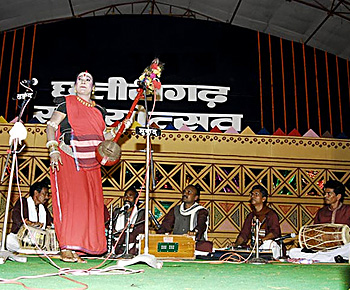 Culture of Raipur District is vibrant and unique. Chhattisgarhi is the local language that most of the people in this area uses. The culture of this district of Chhattisgarh in itself is very rich and interesting. `Baigas` (traditional medical practitioners) apply their own methods (called Jhad phook) to cure diseases and snake bites etc. However, known for their modesty, kindness and adjustable nature people of this area are fond of variety in dressing, entertainment and way of living. Culture of Raipur District has unique styles of music and dance. Raut Nacha, Dewar Nacha, Panthi and Soowa, Padki and Pandwani are some of the popular musical styles and dance dramas. Pandwani is a famous musical way of narrating Mahabharata in this region. Colourful dresses and variety of ornaments are worn by women and men of this region.
Culture of Raipur District is vibrant and unique. Chhattisgarhi is the local language that most of the people in this area uses. The culture of this district of Chhattisgarh in itself is very rich and interesting. `Baigas` (traditional medical practitioners) apply their own methods (called Jhad phook) to cure diseases and snake bites etc. However, known for their modesty, kindness and adjustable nature people of this area are fond of variety in dressing, entertainment and way of living. Culture of Raipur District has unique styles of music and dance. Raut Nacha, Dewar Nacha, Panthi and Soowa, Padki and Pandwani are some of the popular musical styles and dance dramas. Pandwani is a famous musical way of narrating Mahabharata in this region. Colourful dresses and variety of ornaments are worn by women and men of this region.
Various decorative items used by women are Baandha, Suta, Phuli, Bali and Khunti, Ainthi, Patta, Choora, Kardhani on waist, Pounchhi a ring for upper arm and Bichhiya on toes. Men also decorate themselves with Koundhi and Kadhah for occasions like dances. Gouri-Goura, Surti, Hareli, Pola and Teeja are the main festivals of this area. Celebrated in the month of `Sawan` hareli is a mark of greenery. Farmers worship farm equipments and cows on this occasion. They place branches and leaves of `Bhelwa` (a tree resembling cashew tree and found in the forests of this district) in the fields and pray for good crop. People also hang small Neem Tree branches at the main entrance of houses on this occasion to prevent occurrence of seasonal diseases.
Children play `Gedi` (walking on bamboo) from the festival of Hareli to Pola. They also participate in Gedi race. Hareli is also beginning of festivals in this region. Pola and Teeja follow Hareli. People celebrate Pola by worshipping bullocks. Bull race is also a major event of the festival. Children play with Nandia-Bail (Nandi the Vahan of Lord Shiva) idols made of clay and fitted with clay wheels. Teeja is the festival of women. All married women pray for the welfare of their husbands on this occasion. According to the customs, women perform this prayer at their parent`s place. The feeling of togetherness and social harmony is filled in every festival and art of culture of Raipur District.






